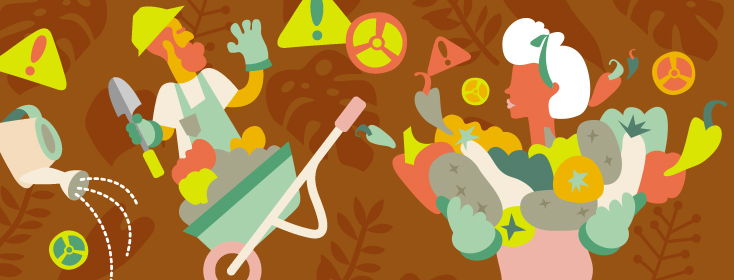What Is The Connection Between Nightshades & Psoriasis?
I can’t remember the first time someone told me I should avoid nightshades to help my psoriasis, but I can probably guess that my first thought once they explained it was: “not my beloved French fries!”
Let's learn about nightshades for psoriasis
If you hang around the psoriasis communities long enough, nightshades are bound to come up in conversation.
You may have been wondering “what’s the deal with nightshades? Does that mean I can’t have pasta sauce anymore? I don’t give two figs about eggplants, but how could I live without pizza?!” Well, here’s a little more info.
What are nightshades?
Not to be confused with belladonna (deadly nightshade), nightshades are fruits, vegetables, and herbs from a specific family of plants called Solanaceae.
The nightshades that people are most familiar with include tomatoes, bell peppers, potatoes, and eggplant. The ones you may not know include tobacco, goji berries, pimentos, and a whole raft of spicy stuff like cayenne, chili peppers, jalapenos, habaneros, etc. Nightshades do not include black pepper or sweet potatoes.
Why do nightshades have such a bad reputation?
The short answer? Alkaloids. Alkaloids are toxic molecules produced by lots of different plants, and the Solanaceae family produces a wide variety. Have you ever eaten a potato that was looking a little green and then fallen ill with the worst stomach ache ever?
That’s due to solanine, a type of alkaloid potatoes produce to protect themselves from being eaten by insects and animals. The other nightshades produce other types of alkaloids and glycoalkaloids, which are naturally occurring pesticides that prevent them from being eaten.
What happens when eating nightshades?
Ingesting alkaloids can increase irritation and inflammation at high doses, some have suggested that those with autoimmune conditions would be best to avoid them.
Some also take issue with the presence of the lectins and saponins that exist in nightshades. The widely circulated theory is that lectins and saponins create leaky gut, which can worsen autoimmunity (or even create it), but there isn’t a ton of research to support this.
Are nightshades bad?
I can feel your eye roll coming, but it really is individualized. Some people are very sensitive to solanine and other alkaloids, and there is anecdotal evidence aplenty to suggest that nightshades really don’t agree with some people. That being said, there is no scientific consensus (that I have found) that suggests we should avoid nightshades.
Yes, alkaloids have toxic properties, but the ramifications for a ladybug are much different than for mammals like us. Remember, the key is that they’re only toxic in very high doses. In fact, some alkaloids may actually benefit us.
For example, tomatine, found in green tomatoes, may flush out cholesterol. 1 Another, anatabine, is a popular supplement for joint pain.2 And of course, fruits and veggies contain lots of phytonutrients and other great stuff.
The research on nightshades and psoriasis
To try and balance the scale back a little, I would be remiss if I didn’t highlight one particular survey result. In 2017, a survey on dietary habits was sent to the members of the National Psoriasis Foundation.
Of the respondents,52.1% said removing nightshades from their diet had improved their skin. We’ve summarized more of the results here, if you’re interested!

Join the conversation